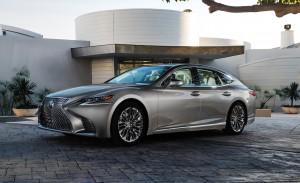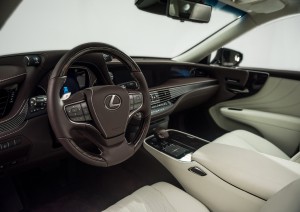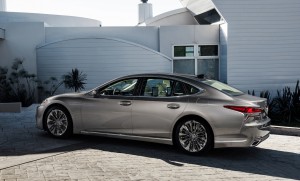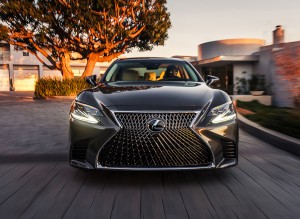
The 2018 Lexus LS 500 features bold new exterior styling, which has been the focus of the company's higher ups.
From automotive upstart to part of the industry’s elite — there’ve been a lot of changes since Lexus made its debut nearly three decades ago. Now, there are new players trying to shake up the established order and its Toyota’s luxury brand that’s on the defensive.
Nothing symbolizes the challenges the Japanese marque faces like the 2018 LS, the fifth-generation remake of its flagship sedan. Since Lexus made its debut in 1989, the LS has symbolized everything the brand stands for: affordable, elegant, high-tech – and green, the full-size sedan becoming the first in its segment offered with a hybrid drivetrain option.
But at a time when SUVs, rather than sedans, have come to dominate the sales charts, is the LS still relevant? And is Lexus, more broadly, keeping pace with the changes reshaping the auto industry, including the race to electrify that has seen major manufacturers like BMW and Mercedes-Benz announce plans to offer battery-based options for every single product they build?
When the 2018 Lexus LS made its debut at the North American International Auto Show last January it took many observers by surprise, adopting a far more aggressive look than the traditionally vanilla versions that preceded it. That was in line with the mandate laid down by Akio Toyoda, president of parent company Toyota, to pump more “passion” into the brand.
(Lexus aims to set new benchmark with 5th-gen LS. For the story, Click Here.)
How well the public will receive the new LS is uncertain, though initial interest in the 2018 model appears to be strong. The problem is that high-line sedans just don’t carry the weight they did in decades past. The luxury market is mirroring what is happening elsewhere in the industry. So, the new Lexus flagship will not only have to face off with competitors like the ’18 updates of the Mercedes-Benz S-Class and Audi A8, but the flood of new, high-line utes that will be coming to market in the near future. That includes production versions of the BMW Concept X7 and Audi’s Q8 concept.
“Some buyers will never walk away from luxury sedans,” said Brian Bolain, Lexus U.S. marketing chief. But a quick look at the brand’s sales reveals just how much things have changed. As recently as 2015, he noted, passenger cars accounted for 50% of Lexus sales. They’re currently running barely 35%.
“In my 35 years in the industry, I don’t ever remember one segment becoming so on fire globally,” said Bolain said during an interview near San Francisco, where automotive journalists recently got their first chance to drive the 2018 LS.
It’s not that Lexus has ignored the SUV market. Its RX is the industry leader in the midsize segment, and it has scored well with the newer NX. But, if anything, it has fallen short by not adding still more utes to its line-up.
While company officials aren’t ready to discuss future product plans, they’re giving some broad hints. “Of course, we are thinking about many possibilities,” suggested Yoshino Sawa, the global head of the Lexus brand, during a break at the Skywalker Ranch, the sprawling George Lucas complex used by the automaker as a base for its LS drive event.
Insiders point to the likelihood Lexus will next add a crossover-ute below the NX. But a full-size model, along the lines of the X7 and Q8, could also follow. It would complement the current Lexus LX but offer a more car-like ride and amenities.
The SUV market isn’t the only place Lexus is playing a game of catch-up. Then there’s the push for electrification. Ironically, no brand made as early – or as extensive – a commitment to conventional hybrids, Lexus offering gas-electric options on a number of models, indeed, adding two models that only came with hybrid drivetrains.
But luxury competitors are rapidly moving to more advanced, battery-based technologies. In June, Volvo announced it would only offer hybrid, plug-in or battery-electric drivetrains on all models launched from 2018 forward. Aston Martin, Jaguar Land Rover, BMW, Mercedes-Benz and Audi will, at the least, offer electrified options for all models.
For its part, Lexus – like parent Toyota – has been reluctant to embrace plug-ins and pure battery-electric vehicles, and there’s still an obvious sense of reluctance as officials struggle with the issue of how to respond to the competition.
“Of course we’re developing EV technology,” said Lexus boss Sawa, before adding a note of caution. “We’ll introduce that kind of vehicle at a suitable time.”
Parent Toyota has announced that it will introduce a new electric vehicle in 2021, as part of a joint venture with Mazda. The new product – or products – will be built at an all-new assembly plant somewhere in the U.S., and it is expected to turn to a breakthrough battery technology known as solid-state.
That will come several years after most key competitors launch their own full-electric models – such as the Jaguar I-Pace and a new electric SUV from Audi. And it’s not even clear if Lexus will get a pure battery-electric vehicle of its own, at least not initially. On the other hand, if Toyota actually does come to market with solid-state batteries it will likely leapfrog the competition, that technology expected to lower costs, improve range and performance and sharply reduce charging times.

While the outside gets a new look, the LS interior continues to enjoy all of the requisite materials for a luxury sedan: leather and wood.
(Click Here for more about the LS 500 F Sport.)
“Not many people will accept” current battery technology, asserted Sawa. If so, being late to market likely won’t matter – as long as Lexus does show up with a real breakthrough.
Along with parent Toyota, Lexus will also have to show it can deliver on a range of other new technologies that are reshaping the industry, including autonomous vehicle systems. But, again, it is unclear if there will be a real first-mover advantage.
Lexus faces other challenges going forward, surprisingly including a sudden slide on quality and reliability charts. The brand actually scored below average on the 2017 J.D. Power Initial Quality Study released earlier this year.
That doesn’t mean its engines are suddenly starting to fail, stressed Bolain. The decline largely reflects challenges with the brand’s latest infotainment technology – usability issues that have plagued other manufacturers, such as BMW. Nonetheless, for a brand that long and frequently topped the quality charts, it has been an embarrassing setback.
“For a brand that was, historically, at or near the top, it doesn’t feel good to us,” the marketing chief acknowledged, stressing that Lexus hopes to resolve its tech troubles as it offers new updates on models like the 2018 LS.
Making matters worse, Lexus watched as new luxury brand Genesis landed at or near the top in a number of recent quality and customer satisfaction charts. The Hyundai spin-off has openly listed Lexus as a key target that it hopes to take sales and share away from.
In its early years, it was Lexus successfully targeting established brands, from Cadillac to Mercedes. And the Japanese maker doesn’t want to see history repeat itself.
(To see more about the updated Lexus NX, Click Here.)
“We still try to see ourselves as upstarts,” said Bolain, adding that the biggest threat Lexus would face would be to grow complacent, “and perceive ourselves as part of the establishment.”



Does Lexus/Toyota actually make money on the LS? Considerable R&D and other investment costs and low sales volume. Is it a loss leader for them? How much do they lose for each one they sell?
That’s a good question, Dr. It’s not something they break out. The platform is shared and the LS is available globally, so the small US numbers aren’t the full story, but one might reasonably question how much of the business case is serving as a halo car for the brand.
Paul E.
This car is just ugly, their market just got smaller with the looks of this car. The veg-o-matic grill is not enticing at all. Any damage to this front end would be seriously expensive to fix.